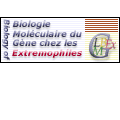
|
|















|
International Summer School
From Genome to Life:
Structural, Functional and Evolutionary approaches
MUS-VETEAU Isabelle |
|
Université de Nice Sophia-Antipolis, Laboratoire de Physiologie Cellulaire et Moléculaire, UMR-CNRS 6548, Bat. de Sciences Naturelles, Parc Valrose,, 06108 Nice Cedex 2, France title: Heterologous expression, purification and structural characterization of eucaryotic membrane receptors Isabelle Mus-Veteau* and Michel Bidet Membrane proteins are of central importance because they are responsable of the interface between the exterior and the interior of the cell, assuming transport processes, sensing changes in the cellular environment, transmission of signals and control of cell-cell contacts. Consequently, their are implicated in numerous diseases like cancer, cystic fibrosis, epilepsy, hyperinsulinism, heart failure, hypertension and Alzheimer. But studies on these disorders are hampered by a lack of structural information about the proteins involved. Our group is interested by the obtention of structural data on different membrane proteins shown to be involved in human diseases such as : the receptors of the sonic hedgehog signalization pathway (PTC and SMO) implicated in various human tumours, including familial and sporadic basal cell carcinomas ; the calcium-sensing receptors which loss and gain of function mutations lead to familial hypocalciuric hypercalcemia, neonatal severe hyperparathyridism, autosomal dominant hypercalcemia and in same cases to prostate cancers ; and various other membrane proteins implicated in muscle atrophy and apoptosis. Structural analysis needs large quantities of pure and active protein. It appears clearly that the obtention of membrane protein structural data from eucaryotic origin depends on the development of methods allowing the production of large quantities of membrane proteins. In order to produce proteins amount needed, we are developping suitable expression and purification systems for each of the protein studied. We selected the yeast Saccharomices cerevisiae and Pichia pastoris as expression systems, and we are elaborating purification strategies using affinity tags based on the TAP (Tandem Affinity Purification) system that allow efficient and reliable recovery of proteins present at low cellular level under native conditions. |